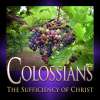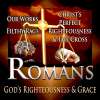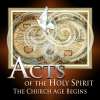
Sunday, January 30, 2011
by Robert Dean
Passage: Colossians
Series: Colossians (2011)
Duration: 47 mins 56 secs

Thursday, April 21, 2011
by Robert Dean
Passage: Romans 1:28-32 & Acts 14:8-20
Series: Romans (2010)
Duration: 1 hr 1 mins 35 secs
Also includes Acts 17:17-33

Thursday, May 12, 2011
by Robert Dean
Passage: Romans 1:26-32
Series: Romans (2010)
Duration: 59 mins 58 secs
Decisions and ideas have consequences. When a person, a tribe, or a culture rejects God, the consequences are devastating. Romans 1:18-23 clearly teaches that all human beings are religious: they all know God exists. Those who reject the God of the Bible always substitute something or someone else to worship. The result is that God then gives us over to our desires. The three stages of divine judgment described in this chapter show the cultural degradation that ensues from the rejection of God.

Sunday, June 12, 2011
by Robert Dean
Passage: Colossians 1:15-17
Series: Colossians (2011)
Duration: 50 mins 40 secs

Sunday, February 03, 2013
by Robert Dean
Passage: Proverbs 3:1-6
Series: Proverbs (2013)
Duration: 55 mins 20 secs
The only knowledge that translates into wisdom is knowledge of the Truth. Enmeshment with Truth is an inseparable relationship. Enmeshment in today’s language implies a dysfunctional relationship where one allows another to define him. In the spiritual realm it is a positive term where we aspire to be defined by, and inseparable from, the Truth of God. Truth acts as our protection from absorbing cosmic thinking. Understand the expanded meanings of mercy and Truth and the imagery behind writing them and binding them. Know that trust is based on specific principles of scripture. Applied trust is certainty that fear has lost its power to intimidate and motivate in light of the Truth that is written on our hearts.

Tuesday, July 23, 2013
by Robert Dean
Passage: Acts 17:16-34
Series: Acts (2010)
Duration: 1 hr 3 mins 5 secs
Why do some people get mad as a hornet when talking about God? Listen to this lesson to learn the vital need for listening to others as they talk about what they already believe. See how the Apostle Paul skillfully used his insight into the Athenians to reason with them in a logical manner. Find out how he challenged them to worship the Creator rather than the creature. Discover key elements to sharpen your Bible study methods.

Thursday, August 01, 2013
by Robert Dean
Passage: Romans 9:3-5 & John 1:1-5
Series: Romans (2010)
Duration: 56 mins 57 secs
If you were asked why you believe in the deity of Jesus Christ, how would you answer? Listen to this lesson to understand that when the Apostle John calls Christ the "Logos", he was emphasizing that Christ pre-existed eternally in personal fellowship with God the Father. See how Christ is the Creator of all things and then became flesh as the God-Man, fully human and fully God. Learn how Isaiah in the Old Testament saw all three Members of the Trinity hundreds of years before Jesus Christ was born in Bethlehem.
Also includes Isaiah 7:14, 9:6; Micah 5:2; Colossians 1:15-17; Hebrews 1:3

Tuesday, August 06, 2013
by Robert Dean
Passage: Acts 17:16-31
Series: Acts (2010)
Duration: 1 hr 11 mins 8 secs
"There's nothing new under the sun." Similar to many people today, the Athenians liked to dazzle everyone with grand words and brilliant insights. Listen to this lesson to see how the Apostle Paul bettered their arguments by tweaking superstitious beliefs so they could understand the gospel. Discover how all primitive religions believed that matter always existed which is a core belief of evolution today. See how clarifying the truths of the Creator God is a vital part of witnessing.
Click here to access Dr. Dean's paper presented at the Conservative Theological Society referenced in this Bible class.

Thursday, September 12, 2013
by Robert Dean
Passage: Romans 9:20-33
Series: Romans (2010)
Duration: 59 mins 44 secs
Insistent questions swirl around God "hardening Pharaoh's heart." Could it mean God made Pharaoh do the evil things he did to the Jews? Paul tackles this question by going to Old Testament scriptures. Learn four ways Old Testament scriptures are used in the New Testament. Review the three Hebrew words for "hardened". See how God's sovereignty is expressed in the destiny of nations but that everyone has the free will to choose or reject God's plan of salvation through His Son, Jesus Christ.